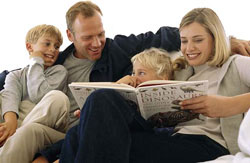If you ask any primary teacher to identify one thing they want parents to do with their kids, the answer will be READ TO YOUR CHILD. On Curriculum Night, we stand in front a large group of parents and beg families to spend time reading to their kids.
Image from Preschool Kids Books.
First off, why is it important to read to your kids? Why do teachers keep telling us to do this?
* Teaching our kids how to read begins with parents reading to their kids.
*It helps kids master language development.
*Reading aloud builds listening skills, increases a child’s attention span, helps kids learn to concentrate, and relaxes children.
*Communication skills and vocabulary increase, the more children listen to reading.
*Children are naturally curious. Reading nonfiction books answers lots of questions and may invite more questions to explore.
*Fiction stories develop creativity and imagination.
*Enjoying picture books together can develop a sense of appreciation for the written words, as well as appreciation for the beautiful art work seen in illustrations.
*The time we spend reading with our kids helps develop a love of learning and life long readers!

So, you’re reading to your child every day. Now what? Well, it’s time to dig a little deeper. Here are a few questions you might consider asking.
*What do you see on the cover?
*What do you know about that topic?
*Can you close your eyes and visualize that?
*What’s happening on this page?
*What do you think is going to happen next?
If you just ask those 5 questions, you are having your child make inferences, use their schema, visualize and use mental images, and make predictions. That’s pretty heavy stuff!
As you’re reading to your kids, please remember that you don’t need to have a degree in reading or 20 years of teaching experience to support your child as a reader. You are already a smart reader and you are your child’s first and best teacher. You have so many skills that you use in your reading every day. Now it’s time to call out those skills, name them, and point them out to your kids as you read.
Remember, readers learn to read by reading to themselves and being read to. Stopping to share your thinking and talk as you read is just as essential as the reading itself.
Happy reading!